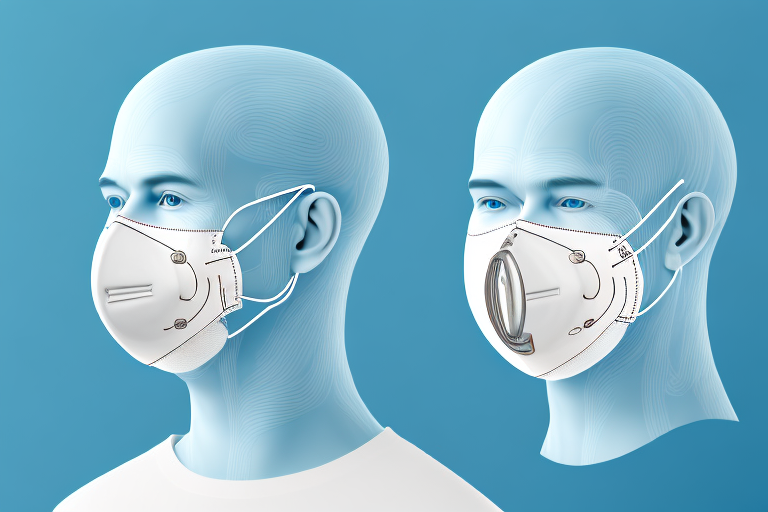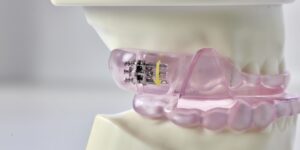Having a good seal is crucial when it comes to using ResMed masks for optimal therapy. The seal of a mask refers to how well it fits and connects with your face, ensuring that there are no leaks during treatment. A good seal is essential because it helps to maintain the necessary pressure levels to effectively manage sleep apnea and other respiratory conditions.
Understanding the Importance of a Good Seal
A good seal plays a vital role in ensuring that therapy is effective and beneficial for the user. When a mask has a proper seal, it allows for accurate delivery of the prescribed air pressure from the therapy device to the airways. This ensures that the treatment is delivered as intended and that the user receives the maximum therapeutic benefits.

But what exactly makes a good seal so important? Let’s delve deeper into the topic.
The Role of a Good Seal in Effective Therapy
A good seal not only prevents air leaks but also helps to optimize therapy by reducing unwanted turbulence and noise. Imagine trying to sleep with a mask that constantly leaks air, causing disruptive sounds and discomfort. A proper seal ensures that the air is directed directly into the user’s airways, minimizing discomfort and increasing comfort during sleep. Also know more about
A good seal not only prevents air leaks but also helps to optimize therapy by reducing unwanted turbulence and noise. Imagine trying to sleep with a mask that constantly leaks air, causing disruptive sounds and discomfort. A proper seal ensures that the air is directed directly into the user’s airways, minimizing discomfort and increasing comfort during sleep. Also learn more about Comparing ResMed Masks: Features, Benefits, and User Feedback by visiting https://hematologyjournal.net/comparing-resmed-masks-features-benefits-and-user-feedback/
Moreover, a good seal aids in maintaining a consistent pressure level, leading to better therapy outcomes. When the seal is compromised, the therapy device may struggle to deliver the prescribed air pressure accurately, resulting in suboptimal treatment. This is why a good seal is crucial for effective therapy.
Factors Affecting the Seal Quality
Several factors can impact the seal quality of ResMed masks. It’s important to understand these factors and address them to enhance the mask’s seal and ensure optimal therapy.
One significant factor is facial structure. Each individual has a unique facial structure, and this can affect how well the mask fits and seals. Some people may have prominent cheekbones or a more rounded face, while others may have a narrower face shape. These differences can influence the seal quality and may require adjustments or different mask styles to achieve an optimal fit.
Movement during sleep is another factor that can affect the seal. Some individuals are more prone to tossing and turning during the night, which can disrupt the seal and lead to air leaks. Understanding one’s sleep patterns and finding a mask that accommodates movement can help maintain a good seal throughout the night.
Facial hair is yet another factor to consider. For individuals with facial hair, especially beards, achieving a proper seal can be more challenging. The hair can interfere with the mask’s ability to create a secure seal, leading to air leaks. In such cases, it may be necessary to trim or groom the facial hair or explore mask options specifically designed for individuals with facial hair.
Weight changes can also impact the seal quality. Significant weight gain or loss can alter the shape of the face, affecting how well the mask fits. Regularly reassessing the mask’s fit and making necessary adjustments can help maintain an effective seal despite weight fluctuations.
Lastly, mask fit is a crucial factor in achieving a good seal. Different mask styles and sizes are available to accommodate various facial shapes and sizes. It’s essential to find the right mask that fits snugly and comfortably, ensuring an optimal seal for effective therapy.
In conclusion, a good seal is not just about preventing air leaks. It plays a vital role in optimizing therapy, reducing discomfort, and ensuring consistent pressure delivery. Understanding the factors that can affect the seal quality and taking appropriate measures to address them is key to enhancing the effectiveness of therapy and maximizing its benefits.
Features of ResMed Masks Promoting Optimal Seal
ResMed masks are designed with various features that contribute to achieving a secure and effective seal. These features not only enhance the overall comfort of the user but also ensure a consistent and reliable therapy experience.
Design Elements for Enhanced Seal
ResMed incorporates design elements such as cushion technology and adjustable headgear to enhance the seal of their masks. The cushion technology ensures a comfortable fit and conformability to individual facial contours, reducing leaks and improving comfort during therapy.
The cushion technology used in ResMed masks is the result of extensive research and development. The cushions are made from high-quality materials that are soft, yet durable, providing a gentle and secure seal. The design of the cushions is carefully engineered to distribute pressure evenly, minimizing the risk of pressure points and discomfort.
Furthermore, the adjustable headgear allows users to customize the fit of the mask according to their preferences and needs. This feature ensures that the mask remains securely in place throughout the night, even with movement during sleep.
Material and Construction for a Secure Fit
The materials used in ResMed masks are selected for their durability and ability to maintain a seal throughout the night. The masks are constructed using high-quality materials that keep the mask in place even with movement during sleep, ensuring a secure fit and minimizing leaks.
ResMed masks are made from hypoallergenic materials that are gentle on the skin, reducing the risk of irritation or allergic reactions. The masks are also designed to be lightweight and breathable, allowing for a comfortable and uninterrupted sleep.
In addition to the materials used, the construction of ResMed masks is meticulously engineered to ensure a secure fit. The masks feature innovative sealing mechanisms that create a reliable seal, preventing air leaks and maximizing the effectiveness of therapy.
Moreover, the masks undergo rigorous testing and quality control measures to ensure that they meet the highest standards of performance and durability. ResMed is committed to providing masks that not only deliver optimal therapy but also withstand the rigors of daily use.
With these advanced design elements, materials, and construction techniques, ResMed masks offer users a superior seal that promotes effective therapy and a comfortable sleep experience. Whether you are a new user or a long-time user, ResMed masks provide the confidence and assurance you need for a successful sleep apnea treatment.
Choosing the Right ResMed Mask for You
Selecting the right ResMed mask is crucial to ensure a good seal and optimal therapy. There are several factors to consider when choosing a mask.
Considerations for Selecting a Mask
Factors to consider include personal comfort, sleep position, facial structure, and the type of prescribed therapy. ResMed offers a range of mask styles, including nasal masks, full face masks, and nasal pillow masks, to cater to different preferences and needs.
When it comes to personal comfort, it’s important to choose a mask that feels comfortable on your face. Some people prefer masks with soft cushions, while others may prefer masks with a more firm fit. ResMed understands that everyone is different, which is why they offer a variety of mask options to suit individual preferences.
Sleep position is another important consideration when selecting a mask. If you tend to sleep on your back, a full face mask may be the best option as it covers both the nose and mouth, ensuring a secure seal. However, if you prefer to sleep on your side, a nasal mask or nasal pillow mask may be more suitable, as they provide a smaller profile and allow for greater freedom of movement.
Facial structure also plays a role in determining the right mask for you. ResMed masks are designed to fit a wide range of facial shapes and sizes. Whether you have a narrow face or a broader face, there is a ResMed mask that can provide a comfortable and secure fit.
The type of prescribed therapy is another factor to consider. If you require continuous positive airway pressure (CPAP) therapy, a mask that covers both the nose and mouth may be necessary to deliver the required air pressure. However, if you are prescribed bilevel positive airway pressure (BiPAP) therapy, a nasal mask or nasal pillow mask may be sufficient, as the pressure is delivered through the nose only.
Fitting Tips for a Better Seal
To ensure a better seal, it is important to properly fit the ResMed mask. Follow the manufacturer’s instructions for fitting the mask, adjusting the headgear, and positioning the cushion. Regularly checking the fit and making necessary adjustments can help maintain a good seal.
When fitting the mask, it is important to ensure that the cushion is positioned correctly on your face. The cushion should sit comfortably on your nose or nose and mouth, depending on the mask style. Adjust the headgear straps to achieve a snug but not overly tight fit. It’s important to find the right balance between comfort and a secure seal.
One helpful tip is to perform a mask fit test before each use. This involves turning on the device and placing the mask on your face without the headgear. Breathe normally and check for any air leaks. If you notice any leaks, adjust the mask and headgear until a proper seal is achieved.
Another fitting tip is to ensure that the mask is clean and free from any debris. Regularly clean the mask according to the manufacturer’s instructions to prevent the buildup of dirt, oils, and bacteria that can affect the seal and overall performance of the mask.
Lastly, it’s important to remember that finding the right mask may require some trial and error. ResMed understands that not every mask will work for every individual, which is why they offer a variety of options. Don’t be discouraged if the first mask you try doesn’t feel right. Keep trying different styles and sizes until you find the perfect fit for your needs.
Maintaining Your ResMed Mask for Longevity
Proper maintenance of ResMed masks is essential for their longevity and continued effectiveness.
Cleaning and Care Instructions
ResMed provides specific instructions on how to clean and care for their masks. Regular cleaning of the mask components, including the cushion, headgear, and frame, helps to maintain their performance and prolong their lifespan. Use mild soap and warm water for cleaning and avoid using harsh chemicals that can damage the materials.
When to Replace Your Mask
It is crucial to replace your ResMed mask according to the manufacturer’s guidelines. Over time, the mask components can wear out, affecting the seal and overall performance. Regularly inspect the mask for signs of deterioration, such as cracks, tears, or loss of elasticity, and replace it when necessary to ensure optimal therapy.
Troubleshooting Common Issues with ResMed Masks
Even with proper care and fitting, there may be common issues that arise while using ResMed masks. Fortunately, many problems can be easily resolved.
Addressing Leaks and Discomfort
If you experience leaks or discomfort during therapy, it may be due to improper mask fit or adjustments. Try readjusting the headgear and cushion position to achieve a better seal. If issues persist, consider consulting with your healthcare provider or ResMed representative for personalized advice.
Solutions for Noise and Airflow Problems
If you encounter noise or airflow problems with your ResMed mask, it could be related to improper assembly or mechanical issues. Ensure that all components are securely connected, and there are no obstructions. In case of persistent problems, reach out to the manufacturer’s customer support for assistance.
By understanding the importance of a good seal, selecting the right ResMed mask, properly fitting and maintaining it, and addressing any common issues that may arise, you can ensure optimal therapy and a restful night’s sleep. Always follow the manufacturer’s guidelines and consult with your healthcare provider for personalized guidance on using ResMed masks and other sleep apnea treatments.






